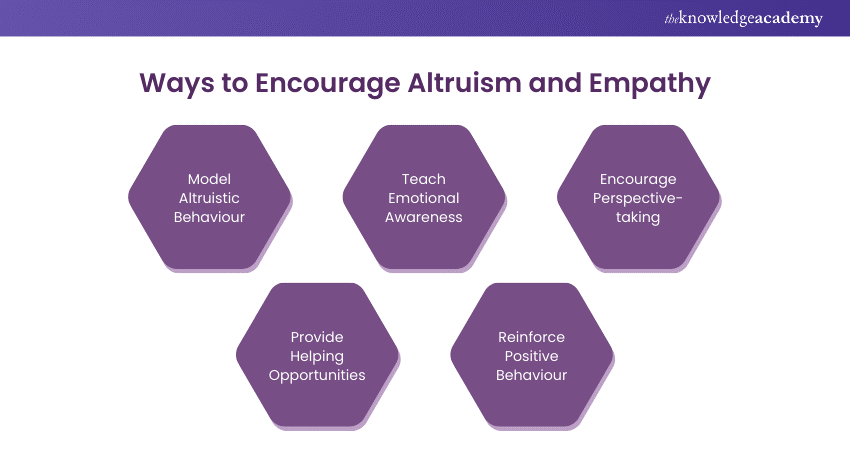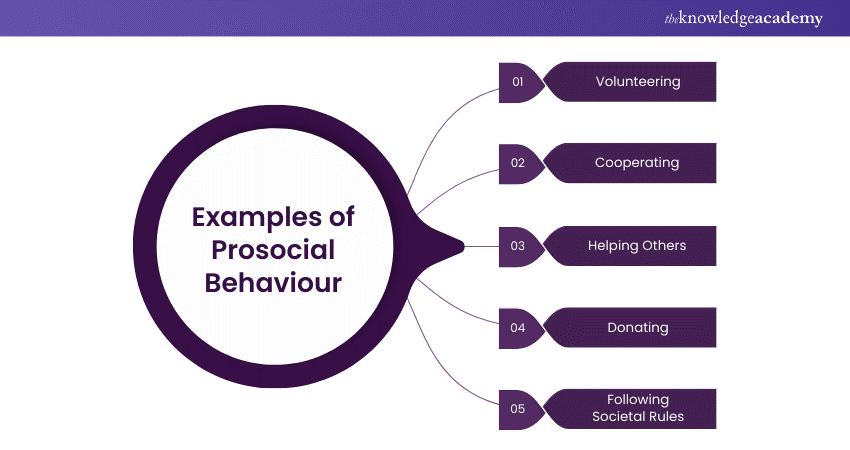We may not have the course you’re looking for. If you enquire or give us a call on +852 2592 5349 and speak to our training experts, we may still be able to help with your training requirements.
Training Outcomes Within Your Budget!
We ensure quality, budget-alignment, and timely delivery by our expert instructors.

Have you ever wondered how small acts of kindness can create a ripple effect of positivity? Think about the instances when a stranger helps an elderly person cross the street, a group of volunteers cleans up a local park, and neighbours come together to support a family in need. These acts of kindness are all examples of Prosocial Behaviour. But what exactly is this behaviour, and why is it so important?
In this blog, we will explore the various facets of Prosocial Behaviour and how it shapes our communities. So, let's delve into such actions significance and discover practical ways to incorporate them into our daily lives.
Table of Contents
1) What is Prosocial Behaviour?
2) The Importance of Prosocial Behaviour
3) Different Types of Prosocial Behaviour
4) Ways to Encourage Prosocial Behaviour
5) The Psychology Behind Prosocial Behaviour
6) Examples of Kinds of Prosocial Behaviour in Action
7) Conclusion
What is Prosocial Behaviour?
The definition of Prosocial Behaviour, as developed by psychology researchers, originated as the opposite of Anti-Social Behaviour. While anti-social Behaviour is often intended to harm others, this behaviour aims to benefit the greater good, regardless of the individual’s motives.
Prosocial Behaviour is a positive form of conduct that benefits others. The study of this behaviour examines how and why people assist each other. It explores why some individuals feel a personal responsibility to engage in prosocial actions and how others might use such behaviours for self-serving purposes.
The Importance of Prosocial Behaviour
Prosocial Behaviour includes actions intended to benefit others, plays a vital role in promoting positive social interactions and building strong communities. Engaging in prosocial actions, such as helping, sharing, comforting, and cooperating, contributes to a more compassionate and supportive society.
1) Enhancing Social Relationships
Prosocial Behaviour cultivates trust and strengthens social bonds. When individuals engage in acts of kindness and cooperation, they build a sense of community and mutual respect. This trust is essential for creating harmonious relationships and fostering social cohesion.
2) Promoting Well-being
Engaging in Prosocial Behaviour has significant benefits for both the giver and the receiver. For the giver, it can lead to improved mood, reduced stress, and a greater sense of purpose. Research has shown that people who help others tend to experience better mental health and lower levels of depression. For the receiver, prosocial actions provide support and relief, enhancing their overall well-being.
3) Building Resilient Communities
Communities thrive when individuals actively participate in Prosocial Behaviours. These actions create a supportive environment where people feel valued and connected. During challenging times, such as the COVID-19 pandemic, communities with higher levels of prosociality demonstrated greater resilience and cooperation, leading to better health outcomes.
4) Encouraging Altruism and Empathy
Prosocial Behaviour encourages the development of empathy and altruism. By helping others without expecting anything in return, individuals learn to understand and share the feelings of others.

This empathy is crucial for creating a more compassionate society where people are motivated to act for the greater good.
5) Positive Health Effects
Prosocial Behaviour is linked to numerous health benefits. Studies have found that individuals who engage in volunteering and other forms of helping Behaviour tend to live longer and healthier lives. Prosocial actions can reduce the negative emotional effects of stress and contribute to overall physical and mental health.
Different Types of Prosocial Behaviour
While Prosocial Behaviour is often viewed as a single, uniform dimension, some research indicates that there are distinct types. These types are differentiated based on their underlying motivations that include:
1) Reactive
Actions performed in response to the needs of others. These behaviours are typically spontaneous and driven by immediate circumstances.
2) Altruistic
Actions intended to help others without any expectation of personal gain. Such actions are motivated purely by the desire to benefit others.
3) Proactive
Prosocial actions that serve self-benefitting purposes. These actions are often planned and executed to achieve personal goals.
Unlock your full potential and drive your organisation's success - sign up for our Personal & Organisational Development Training now!
Ways to Encourage Prosocial Behaviour
Cultivating Prosocial Behaviour can benefit individuals and lead to broader societal advantages. If you aspire to live in a better world, you can start by taking action in your own life. Such behaviours not only benefit your community but also serve as a model for others to emulate. Some strategies to help foster this behaviour include:
1) Model Prosocial Actions
One of the best things you can do is to lead by example. Be empathetic, help out when you see a need, and don’t hesitate to volunteer for the causes you care about.
2) Show Compassion and Empathy
Take the time to put yourself in other people’s shoes. When you understand others and recognise their plight, you are more likely to be moved to help.
3) Be Ready to Assist
You are more likely to take action if you feel equipped with the knowledge and skills to be helpful. Learning how to manage conflict and acquiring basic first aid and CPR skills can put you in a better position to assist in emergency situations.
The Psychology Behind Prosocial Behaviour
Understanding the psychology behind Prosocial Behaviour helps you appreciate why people choose to help others and how various factors influence these actions. Let's look at them in detail:
1) Personal Influences
Personal characteristics significantly impact Prosocial Behaviour. Factors such as empathy, moral reasoning, and personality traits like agreeableness and conscientiousness influence one’s likelihood to help others. People with strong empathy are more inclined to engage in helping behaviours.
Additionally, those with internalised moral values and a sense of responsibility are more likely to act prosocially. Childhood experiences in nurturing environments also shape one’s tendency to help.
2) Does Being Watched Affect Behaviour?
The presence of an audience can enhance Prosocial Behaviour, known as the “audience effect.” Individuals are more likely to help when they believe they are being observed, as it heightens their concern for reputation and social image. Even subtle cues, like images of eyes, can increase prosocial actions by making people feel watched. The desire for positive social perception drives altruistic Behaviour.
3) The Bystander Effect
The bystander effect occurs when individuals are less likely to help a victim in the presence of others. This phenomenon is due to diffusion of responsibility, where people feel less personal obligation to act, believing others will intervene. Social influence also plays a role; if no one else helps, individuals may perceive the situation as non-urgent.
Fear of judgement or making mistakes can further inhibit action. Understanding this effect is crucial for encouraging Prosocial Behaviour in group settings.
Join our Team Development Training and equip your team with the skills to seamlessly work together!
Examples of Kinds of Prosocial Behaviour in Action
Prosocial Behaviour encompasses actions intended to benefit others, promoting social acceptance and friendship. These behaviours can range from small acts of kindness to significant contributions to society. Here are some common examples:

1) Volunteering
Volunteering at a local food bank, tutoring students in need, or participating in community clean-up events are all great examples of volunteering. These activities help improve the community and provide support to those who need it.
2) Cooperating
Working together on a group project, collaborating with colleagues to solve a problem, or participating in team sports are examples of cooperation. Cooperation involves working with others towards a common goal, often leading to better outcomes than working alone.
3) Helping Others
Assisting an elderly neighbour with their groceries, offering to help a friend move, or providing emotional support to someone going through a tough time are all ways of helping others. These actions can significantly impact the well-being of individuals and strengthen social bonds.
4) Donating
Donating money to a charity, giving clothes to a shelter, or contributing food to a food drive are examples of donating. Donations can provide essential resources to those in need and support various causes and organisations.
5) Following Societal Rules
Adhering to traffic laws, respecting public property, and following community guidelines are examples of following societal rules. These behaviours help maintain order and safety within a community, ensuring that everyone can coexist peacefully.
Conclusion
Prosocial Behaviour is the cornerstone of a thriving, compassionate society. By embracing actions that benefit others, you can enhance our communities but also enrich our own lives. Whether through cooperating, or simply lending a helping hand, every act of kindness contributes to a better world. Let’s make it a daily habit and inspire others to do the same.
Take the first step towards becoming an effective leader - sign up for our Management Courses today!
Frequently Asked Questions

The key point of Prosocial Behaviour is acting in ways that benefit others or society as a whole, promoting positive social interactions and community well-being.

Prosocial Behaviour is usually motivated by empathy, altruism, social norms, or the desire for social approval, often driven by a sense of moral responsibility.

The Knowledge Academy takes global learning to new heights, offering over 30,000 online courses across 490+ locations in 220 countries. This expansive reach ensures accessibility and convenience for learners worldwide.
Alongside our diverse Online Course Catalogue, encompassing 19 major categories, we go the extra mile by providing a plethora of free educational Online Resources like News updates, Blogs, videos, webinars, and interview questions. Tailoring learning experiences further, professionals can maximise value with customisable Course Bundles of TKA.

The Knowledge Academy’s Knowledge Pass, a prepaid voucher, adds another layer of flexibility, allowing course bookings over a 12-month period. Join us on a journey where education knows no bounds.

The Knowledge Academy offers various Management Courses, including the Managing Remote Teams Course, Senior Management Training, and Anti Social Behaviour Training. These courses cater to different skill levels, providing comprehensive insights into Diversity in the Workplace.
Our Business Skills Blogs cover a range of topics related to Social Behaviour, offering valuable resources, best practices, and industry insights. Whether you are a beginner or looking to advance your Business skills, The Knowledge Academy's diverse courses and informative blogs have got you covered.
Upcoming Business Skills Resources Batches & Dates
Date
 Anti Social Behaviour Management Training
Anti Social Behaviour Management Training
Fri 27th Dec 2024
Fri 3rd Jan 2025
Fri 28th Mar 2025
Fri 23rd May 2025
Fri 4th Jul 2025
Fri 5th Sep 2025
Fri 24th Oct 2025
Fri 5th Dec 2025







 Top Rated Course
Top Rated Course



 If you wish to make any changes to your course, please
If you wish to make any changes to your course, please


